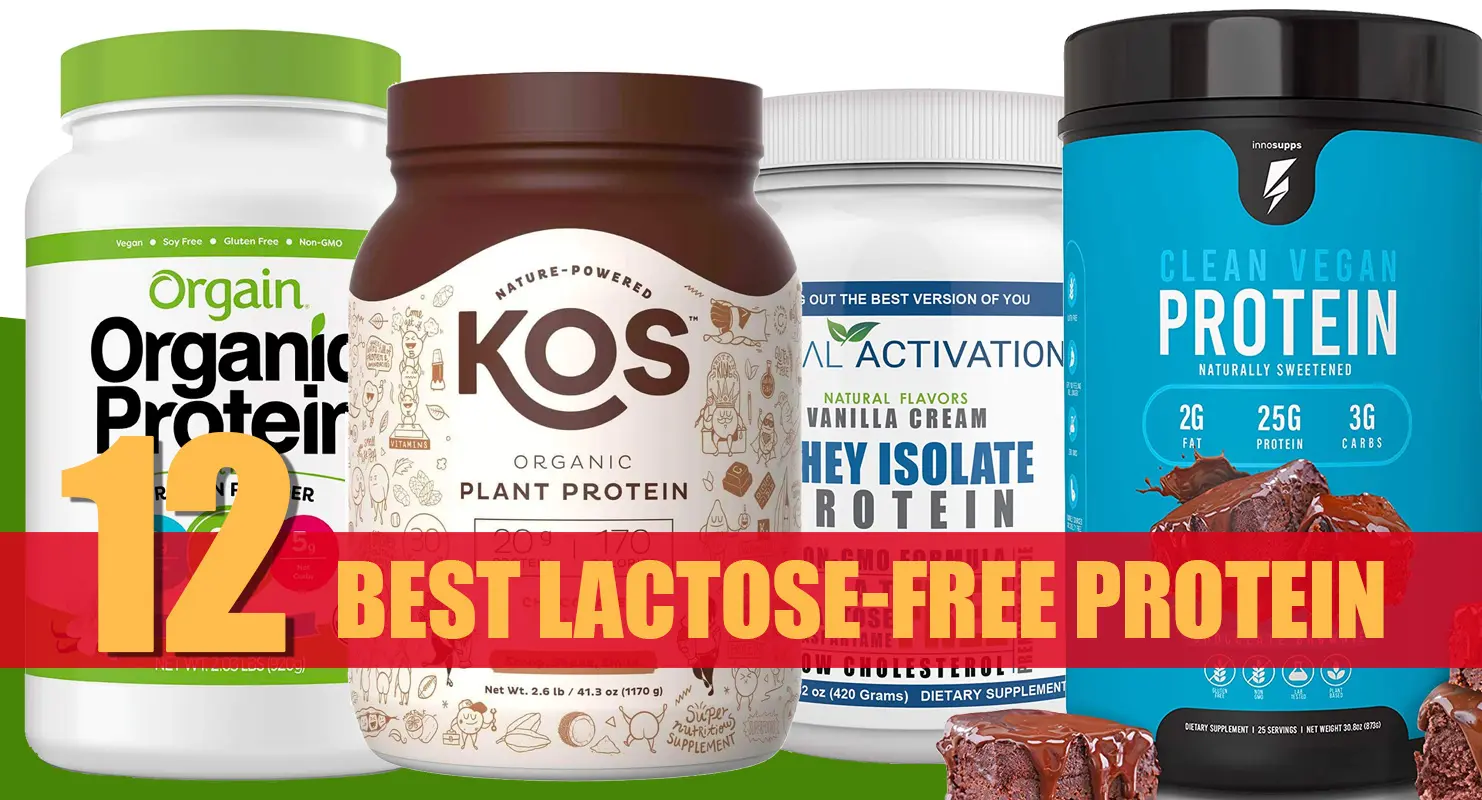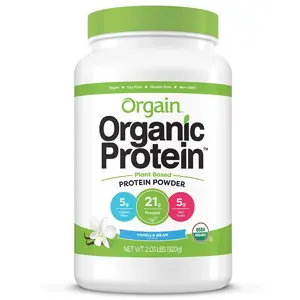Our list of best lactose-free protein powders includes several quality options that we think are among the best available right now. Lactose is the sugar in milk that can cause stomach upset in those without enough of the digestive enzyme lactase. Well, this is the case for many users which can make your experience very unpleasant.
The obvious good news is that you don’t have to experience this thanks to the great protein offerings available.
There are so many flavors, textures, ingredients, and even price ranges. But hopefully, we can make the choice much easier if you’re considering picking one to include in your daily health and fitness regime.
So, here our best picks for 2022 that we think you’ll like. Plus, we broke down the muscle-building, health-promoting, and weight supporting benefits of protein…
Ranking the Lactose-Free Protein Powders
- Orgain Organic Protein Powder – Buy here – Editor’s Choice
- KOS Organic Plant Protein – Buy here
- Isopure Zero Carb Protein Powder – Buy here
- Legion Whey+ Whey Protein Powder – Buy here
- BiPro Elite Whey Protein Isolate – Buy here
- EarthChimp Vegan Protein Supershake – Buy here
- Total Activation Whey Isolate Protein – Buy here
- Iconic Grass-Fed Protein Powder – Buy here
- Liv Body Liv Pure Lean Whey Isolate Protein – Buy here
- Inno Supps Clean Vegan Protein – Buy here
- Optimum Nutrition Gold Standard 100% Plant-Based Protein – Buy here
- About Time Whey Protein Isolate – Buy here
Editor’s Choice – Orgain Organic Protein Powder – 9/10
Why did we choose Orgain as our top pick?
Product highlights:
- USDA organic
- No artificial ingredients
- Complete plant-based protein blend
- Naturally flavored and sweetened
- No added sugar
- Low net carbs
- Decent fiber (5g per serving)
- Gluten-free
- Soy-free
Pros
- USDA organic
- No artificial ingredients
- Complete plant-based protein blend
- Naturally flavored and sweetened
- No added sugar
- Low net carbs
- Decent fiber (5g per serving)
- Gluten-free
Cons
- Some user may not like the taste of Stevia
- Gums and erythritol can cause GI discomfort
Orgain protein is one of, if not the most popular plant-based proteins on the market. It’s a completely dairy-free option made from an organic blend of pea, brown rice protein, and organic chia seed. Each serving provides 21 grams of protein to support muscle growth and at 150 calories it’s not the lowest calorie product but still not bad at all.
You also get 4g fat, 0g cholesterol, 15g (5%) carbs, 5g fiber, no sugar, 5g erythritol, and 21g protein per serving. There’s also 66mg (6%) of calcium, 6mg (35%) of iron, and 67mg (2%) potassium.
Calcium is important for nerve and heart health, iron helps to transport oxygen throughout the body, and potassium is an electrolyte also important for nerve and heart function.
Fiber is considered a carb and between the two different forms (soluble and insoluble), you’ll benefit from things like lower cholesterol, improved blood sugar, and healthier bowel movements.
This is a soy-free product.
Ingredients
- Protein – Pea, brown rice, and organic chia seed protein blend make up a complete source of protein.
- Creamer base/high oleic sunflower oil – The formula contains an organic creamer base that consists of high oleic sunflower oil in addition to a few other ingredients to improve the quality and consistency of the powder. High oleic sunflower oil is one of the healthier oils and a monounsaturated fatty acid that may have positive effects on cholesterol. (1, 2)
Although, we don’t know exactly how much sunflower oil is used so there may not be much to really expect a lot of benefits as a result.
- Gums – Orgain also contains three gums which include organic acacia, guar, and xanthan gum. These are used as stabilizers and thickeners but cause gastrointestinal (GI) distress for many people although definitely for everyone.
- Sweeteners – Stevia is a natural sweetener safe in reasonable amounts and erythritol (sugar alcohol) is unique in that most of it is absorbed in the bloodstream compared to most other sugar alcohols. Therefore, you’re likely to experience less digestive discomfort comparatively. (3)
Who makes it?
The product is made by Orgain, which was founded by a former medical professional and cancer survivor. He saw the need for healthy nutrition after being recommended unhealthy shakes with his condition. So he and his mom started making organic shakes and from there, a new brand was born.
Related: Best Stevia Products From Top-Notch Brands Reviewed for 2024
KOS Organic Plant Protein – 8.75/10
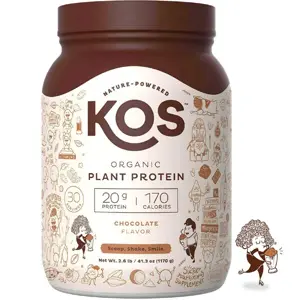
Pros
- Pure organic ingredients
- Complete plant-based protein blend
- Contains digestive enzyme blend
- Naturally sweetened
- Gluten-free
Cons
- Few user complaints about taste and digestive discomfort
KOS protein powder is a unique option that has emerged as one of the top plant-based protein supplements on the market. Aside from the incredibly-attractive and interesting package, they offer a complete protein blend combined with quality extras to support good health and to ensure you get a great-tasting shake.
With each serving, you get 170 calories, 6g fat, 9g (3%) carbs, 2g (7%) fiber, 2g sugar, and 20g protein. This is a higher-calorie option compared to most of our other picks.
In addition, the product supplies a range of minerals such as zinc, selenium, copper, and chromium. Minerals are essential for heart, brain, muscle, and nerve health, in addition to hormone and enzyme production. Plus, you get a nice dose (40%) of vitamin B12 which is needed for blood cell health, DNA synthesis, and neurological function.
This is a soy-free product.
Ingredients
- Protein blend – Each dose provides a nice combination of protein sources for completeness, which include organic pea protein, organic flax seed, organic quinoa, organic pumpkin seed protein, and organic chia seed.
- DigeSEB enzyme blend – Amylase, protease, Lipase, lactase, and cellulase help to break down macronutrients (protein, carbs, and fat) for healthier digestion and optimal utilization of these nutrients.
- Additional ingredients – KOS is infused with organic Peruvian cacao, organic Himalayan pink salt, organic coconut milk, a dash of organic stevia and organic monk fruit. Coconut milk contains saturated fats such as medium-chain triglycerides. Coconut milk and sea salt provide electrolytes for hydration support. Monk fruit is a natural sweetener that actually gets its sweetness from antioxidants called mogrosides.
Who makes it?
The name KOS is based on the Greek island of the same name. The company notes its inspiration from Hippocrates who was from this isle and an iconic figure in medicine. “We dig the simplicity and purity of the Hippocratic approach to health,” is written on their about page.
Read: KOS Organic Plant-Based Protein Powder Review (2020)
Isopure Zero Carb Protein Powder – 7.75/10
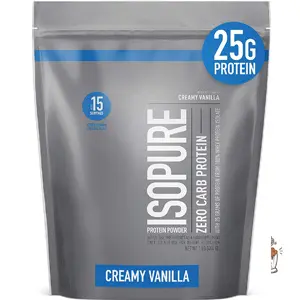
Pros
- Low-carb
- No sugar
- Gluten-free
- rBST-free
Cons
- Many user complaints about taste
- Contains soy (not ideal for everyone)
- May cause digestive discomfort
- Contains artificial sweetener sucralose (dealbreaker for many)
Isopure zero carb protein is ideal for those who prefer to get some additional protein in their diet without the carbohydrates, fats, or sugar included. It’s also keto-friendly in addition to an isolate that should be easy on the stomach for most users.
The product is made from 100% whey isolate protein supplying 25g per serving. There are only 100 calories per serving in addition to 0g fat, 10mg (3%) cholesterol), 0g carbs, and 0g sugar. Every serving also contains a notable amount of vitamins and minerals.
Ingredients
- Protein – Whey protein isolate goes through an additional filtration process to reduce the fats, carbs, and lactose content. As a result, it’s composed of over 90% protein and much better for those with dairy sensitivities.
- Vitamins and minerals – Contains full profile including calcium, vitamins A, C, E, K, B vitamins, magnesium, zinc, manganese, and more.
- Sucralose – This artificial sweetener is calorie-free and a lot sweeter than sugar without the bitter aftertaste of many sweeteners. It’s deemed safe by the FDA based on 110 safety studies. (4, 5)
Who makes it?
Isopure has been around since 1984 and was started by two men, Hal and Ernie with a cement mixer. The company is focused on making simple and effective products the right way and with minimal processing.
Legion Whey+ Whey Protein Powder – 8.5/10
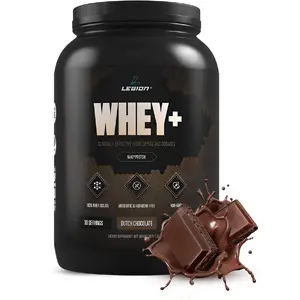
Pros
- 100% grass-fed whey isolate
- Low-calorie
- Low-carb
- No fat
- 0 added sugars
- Gluten-free
- Naturally-sweetened and flavored
- Third-party tested
- GMP certified
- Labdoor certified
- No fillers or artificial nonsense
Cons
- Contains soy (not ideal for all users)
- May cause digestive discomfort
Legion Whey+ is a top Labdoor-ranked product that has many amazing qualities, hence why we consider it to be one of the best lactose-free protein powders. The ingredients are sourced from Irish dairy farms which are some of the best in the world.
With every shake, you get 22g 100% whey protein isolate and only 100 calories for an ultra-low calorie protein option.
There’s no fat, only 3g (1%) carbs, and zero added sugar in this formula. Not to mention, it’s naturally-flavored and sweetened with Stevia for those who despise the artificial stuff. It does have xanthan gum which could affect the stomach a little but not likely.
Ingredients
- Protein – 100% grass-fed whey isolate is ideal for sensitive stomachs and it’s a purer form of protein.
- Natural sweetener – Stevia is used to sweetener this product and nothing else.
Who makes it?
Legion Athletics was founded by bestselling author Mike Matthews. His goal was to make science-based sports supplements that have plenty of what you do want and none of what you don’t.
BiPro Elite Whey Protein Isolate – 9/10
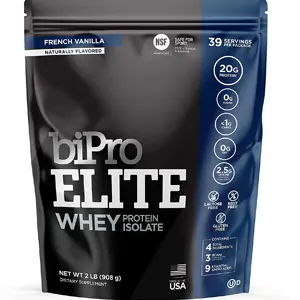
Pros
- NSF certified for sport
- Locally produced
- Naturally-flavored and sweetened
- Only 4 ingredients
- Low-calorie
- No fat
- Very low-carb
- Zero sugar
- Gluten-free
Cons
- Some user complaints of taste
Where BiPro really shines is the fact that they monitor the entire process that results in the end product. Their whey isolate is very simple with only four ingredients and a very attractive profile.
One serving contains only 90 calories which is the least we’ve seen so far in our product selections. In addition, there’s <1g (1%) carbs, and 20g of protein. A dose also contains 2.5g of leucine which is the most important branched-chain amino acid for stimulating muscle growth.
This whey protein is also loaded with amino acids which are essential to the muscle-building, recovery process, and more.
Ingredients
- Protein – 100% whey protein isolate is locally-sourced from farmers in Idaho and Minnesota.
- Sweetener – Stevia is used as a natural sweetener.
Who makes it?
Agropur Inc., the parent company of BiPro, invests in the farmers and facilities that allow them to produce such quality whey products. Their clear label means there’s no sugar, fillers, and only natural flavors and sweeteners.
EarthChimp Vegan Protein – 9/10
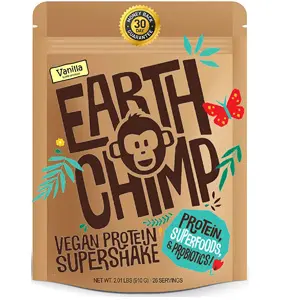
Pros
- All-natural
- Complete protein blend
- Contains superfood and probiotics
- 4g fiber
- Gluten-free
- Gum-free
- Non-GMO
- Digestive enzyme blend
- 1 tree planted for every order
Cons
- Some user complaints of taste and texture
EarthChimp is an awesome brand with a mission beyond just producing great protein shakes. In fact, with every purchase made, they plant one tree. They’ve included a fruit and veggie blend, superfoods, probiotics, and a digestive enzyme blend in this health-focused protein mix.
Every serving contains 120 calories, 2g fat, 0g cholesterol, 11g (4g) carbs, 5g fiber, 3g (0 added) sugar, and 20g protein.
This is a soy-free product.
Ingredients
- Protein – Pea, pumpkin, coconut, and sunflower
- Veggie and fruit blend – Date, banana, strawberry, beet, kale, and spinach, chicory root fiber
- Superfood blend – Flax, cacao, baobab, cinnamon and turmeric, Monk fruit extract, Madagascar vanilla extract, natural vegan flavors. Superfoods contain health-promoting properties that also protect us against illness.
- Probiotic & digestive enzyme blend – Bacillus coagulans, amylase, protease, cellulase, lactase, and lipase. Probiotics are live microorganisms that can help to maintain and restore healthy gut bacteria which is important for overall health.
- Contains coconut and possibly traces of peanut, sesame, and nuts
Also read: 10 Effective Probiotic Supplements For Men And Women In 2020
Who makes it?
Earth chimp was founded in Dublin, Ireland by a husband (track athlete and father) and wife (M.D. and mother) duo who desired to have healthy, convenient nutrition to support their busy lifestyles.
Related: Best Vegan Protein Powders Reviewed In 2020
Total Activation Whey Isolate Protein – 8.5/10
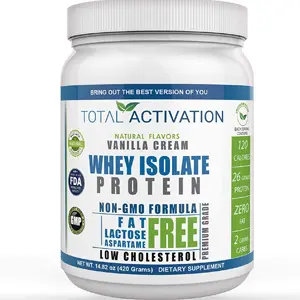
Pros
- Natural ingredients
- Made in FDA facility
- Third-party tested
- Naturally-sweetened
- Fat-free
- Low-carb
- Non-GMO
Cons
- Several user complaints about taste
Total activation whey isolate is another viable source of protein supplying 120 calories, 0 fat, 5mg (2%) cholesterol, 2g (<1%) carbs, <1g sugar, and 26g protein. It’s made in an FDA-inspected facility and tested for purity and potency.
This protein powder makes for a convenient and nutritious option for an active or busy lifestyle.
This is a soy-free product.
Ingredients
- Protein – Total Activation is made from whey isolate.
- Sweeteners – Stevia and monk fruit extract are used to sweeten the powder.
- Additional ingredients – Sunflower lecithin improves texture and mixability.
Who makes it?
Total Activation is a women’s-based company focused on skincare and nutritional supplements. It’s a family-owned company dedicated to bringing quality, organic, and natural ingredients to help women feel “forever young”.
Iconic Grass-Fed Protein Powder – 8.25/10
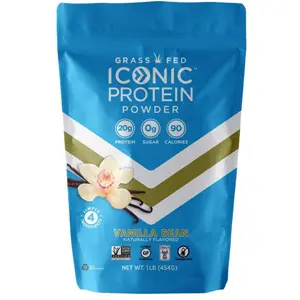
Pros
- Low-calorie
- Low-carb
- Gluten-free
- Keto-friendly
- No sugar
- Non-GMO
- Naturally sweetened
Cons
- Several user complaints of too much sweetness
- Concerns with mixability
If you like very simple then you’ll appreciate this 4-ingredient protein from Iconic that comes from a grass-fed source that is healthier and more nutritious.
There are just 90 calories per serving in addition to 20g of protein, .5g fat, 10mg (3%) cholesterol, 3g (1%) carbs, and 0g sugar. In addition, 35% of calcium is provided along with 6% iron, and 4% potassium.
This is a soy-free product.
Ingredients
- Protein – Milk protein isolate from grass-fed cows contains more vitamins and minerals
- Other ingredients – Natural flavor, monk fruit extract, and sea salt
Who makes it?
Iconic was created by Billy Bosch who after developing chronic health issues, desired to have quality nutrition that wasn’t loaded with artificial ingredients and tons of sugar. So he created protein shakes with quality ingredients, less junk, and that tastes good.
Liv Body Liv Pure Lean Whey Isolate Protein – 8.25/10
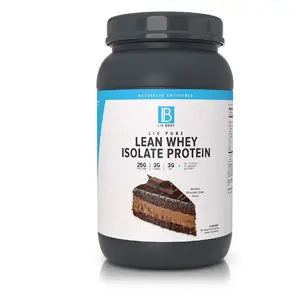
Pros
- No artificial sweeteners
- Low-fat
- Low-carb
- Gluten-free
- Has 5.91g BCAA per serving
Cons
- Contains soy (deal breaker for many)
- Gums may cause some digestive discomfort
Liv Body isolate is an easy-to-digest, low-fat, low-carb, quality protein powder that is also versatile meaning you can use it for shakes, snacks, baking… you name it!
A serving of Iconic protein contains 160 calories, 3g fat, <5mg (<2%) cholesterol, 2g fiber, and 25mg protein. Calcium, iron, and potassium.
Ingredients
- Protein – Instantized whey protein isolate
- Additional ingredients – Medium-chain triglyceride powder from coconut and palm kernel are good for energy. Organic agave inulin adds sweetness and a good source of fiber beneficial for digestive health.
Who makes it?
Liv Body makes all-natural products that are safe and free of any potentially harmful ingredients. The company believes this is key to looking and feeling your best. In addition, they pride themselves on good manufacturing processes while measuring their formulas are lab-tested for optimal quality.
Inno Supps Clean Vegan Protein – 8/10
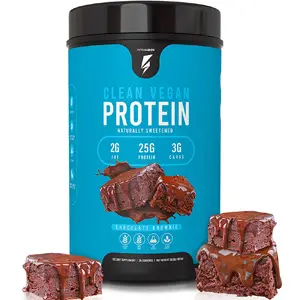
Pros
- No artificial sweeteners
- Gluten-free
- Low-carb
- Low-fat
- No added sugars
- Non-GMO
Cons
- Few complaints about taste and smell of product
InnoSupps plant-based protein offers much more than a quality source of pea protein that offers superior bioavailability. It’s also loaded with superfoods and a digestive enzyme formula which is definitely beneficial. The company prides itself on its clean formulas that are lab-tested for purity and potency.
Every serving has 140 calories, 2g fat, 3g carbs, and 25g protein while offering a nice amount of calcium, iron, phosphorus, magnesium, and potassium.
This is a soy-free product.
Ingredients
- Protein – All of the protein in this formula is from yellow peas. It’s highly bioavailable and an overall superior form of plant protein.
- Antioxidant and greens – Antioxidant blend consists of acai, goji, and a healthy dose of a variety of greens (kale, chlorella, spirulina, and more). Acai and goji might support healthy cells by staving off harmful free radicals.
- Digestive enzyme blend – Amylase, protease, lipase, cellulase, and lactase help to digest protein and use it for muscle-building and overall health.
Who makes it?
InnoSupps pride themselves on making “clean ingredients you can trust”. They claim to only include patented ingredients all in a lab-tested formula while taking the customer experience very seriously.
Optimum Plant-Based Protein – 7.75/10
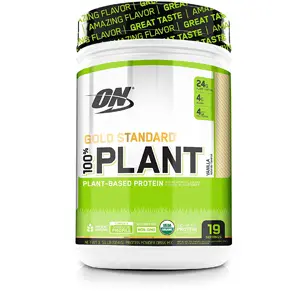
Pros
- USDA organic
- Informed choice sport
- Natural flavors and sweeteners
- Gluten-free
- Non-GMO
- GMP certified
- 100% vitamin C for immune support
Cons
- Some user dissatisfaction with taste and smell
- Gums (Guar Gum, Xanthan Gum) can cause digestive discomfort
Optimum Nutrition saw much success with its flagship Gold Standard 100% whey in addition to their long line of products. So it made sense to release their first-ever plant-based protein powder that has received the attention of many protein powder enthusiasts.
A serving size of this lactose-free vegan-friendly option contains 150 calories. 3g fat, 7g (3%) cholesterol, 7g (3%) carbs, 2g fiber, 1g sugar, and 24g protein per serving. A dose also contains a healthy amount of calcium, iron potassium, and B12.
Ingredients
- Protein – Organic Pea, Organic Rice, and Organic Sacha Inchi proteins provide a complete essential amino acid profile.
- Grain blend – Ancient grains blend of Amaranth, Quinoa, Buckwheat, Millet, and Chia. Also great plant protein sources.
- Additional ingredients – Cyanocobalamin is a man-made form of B12 and a serving supplies a full dose of vitamin C for Immune system health.
Who makes it?
Optimum Nutrition is undoubtedly the most popular supplement company among protein product users. They started in 1986 and now have state-of-the-art facilities around the United States. This is a company that has a very good track record and a massive fanbase.
About Time Whey Protein Isolate – 7.75/10
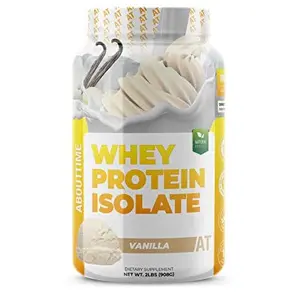
Pros
- Naturally-flavored and sweetened
- Gluten-free
- Fat-free
- Low-sugar
- Non-GMO
Cons
- Several complaints about taste
- Many users not happy about return policy
About Time whey isolate is a clean, pure product that provides overall quality and a focus on limiting what’s unnecessary in an effort to have a solid good formula. They also disclose that they test for heavy metals and have reports of the extremely low amounts compared to many other products.
Not to mention, they blend and package in their powders in at their facilities, sourcing their whey from local farms.
Each serving contains 110 calories, .5g fat, 13mg (4%) cholesterol, 1g (1%) carbs, 1g sugar, and 25g protein.
This is a soy-free product.
Ingredients
- Protein – Non-GMO micro-filtered whey isolate
- Additional ingredients – Natural flavors, xanthan gum, and Stevia
Who makes it?
Like many companies, About Time was started out of the need for better quality supplements. It was founded by a duo of who wanted to bring clean products with little junk to the market.
How We Ranked
In choosing our list of best lactose-free protein powders, there was a certain criterion that we followed to ensure, we opted for the best possible options.
Effectiveness
The most important ingredient in a protein powder supplement… is protein. But we did choose several plant-based proteins. And many people would have a problem with this because they might think they aren’t getting a complete protein which means it contains all nine essential amino acids.
Amino acids are the building blocks of protein and play an important role in health and tissue growth. And it’s known that animal products are complete proteins. This is the same with dairy-based protein powders which are also on our list. (6)
But you can absolutely get all nine essential amino acids from a plant-based protein. It just depends on the product. Some plant-based proteins are complete while others are not. But that’s easily fixable by combining plant proteins to get all of your amino acids. (7)
The plant-based proteins on our list do consist of several protein sources. But even if low in one or two amino acids, you should be eating other foods to ensure you’re not deficient in any nutrients. Protein shakes make an excellent supplement to an already good diet consisting of whole food sources. But they shouldn’t be your only source of nutrition.
Pea, brown rice, chia, pumpkin, flax, chia, quinoa, etc… these ingredients make for a pretty good plant protein combination.
The other ingredients should fit your goals and can be more flexible, of course. As long as you get good quality protein from a protein supplement then you should expect to get just that. So, if there’s anything added like digestive enzymes and/or superfoods, then you might opt for an option containing these health-promoting ingredients.
We provided several options so that you can have your pick.
The Use
Protein powders can be used for different purposes. For example, you may just want a low-calorie protein snack to keep you full so that you won’t be tempted to overeat. Maybe you’re on a low-calorie diet for the purpose of losing weight. Or you might even be looking to put on some weight and protein powder makes for a good base to add other ingredients too.
Weight loss and daily protein supplementation
Certain protein powders are lower-calorie while also containing no fat, low to no carbs, and 0 sugar. Therefore, if you wanted to lose weight, choosing a protein powder like the BiPro Elite Whey Protein Isolate protein would be your best option. It only has 90 calories per serving, plus no fat, <1g (1%) carbs, and it’s a simple whey isolate.
This would also be a good choice to include in your daily nutrition regime if you’re needing some extra protein and like the convenience of shake. But we also included several other proteins with similar profiles and so you really can’t go wrong with those either.
Building muscle and strength
Need a little more calories to gain more size and strength? The Orgain and KOS protein powders (first two products on our list) contain more calories and carbs than the other protein powders on the list, having 150 and 170 calories respectively. These would be good for those looking to get in some additional calories.
And you’d honestly get more bang for your buck if you added some other ingredients such as a banana, nut butter, oats, etc, to make an even higher-calorie shake. So you can see that there’s a lot of versatility with protein shakes.
Culinary
If we’re going to mention versatility, then we can’t forget that you can make protein snacks and desserts using these protein powders. There are many great recipes online that you can try out!
Overall value
We don’t want you to overpay for anything, much less a protein supplement. There are literally so many great options out there although we think the ones you’ll find above are among the best values that you can find right now.
But value is actually subjective because it depends on what you’re looking for in a product.
We consider a good value to be a combination of…
- Quality of ingredients
- Amount of servings for the price
- Company reputation/history
- User feedback
For the most part, these are the most important determining factors in ensuring you choose the best possible product for you.
Some protein powders are no-frills, basic options while others have extras. Either can be a good option. So, you’ll need to be the one to decide on whether something is a value to you. Just take our advice and consider the above-mentioned criteria.
Who Should Buy Lactose-Free Protein Powders
The easy answer is anyone who has a sensitivity to lactose which is the sugar in milk. And those sensitive to lactose cannot digest it often due to a lack of the digestive enzyme lactase. Hence the reason for all of the stomach discomfort associated with many dairy products.
Gastrointestinal discomfort is no fun but it definitely doesn’t have to be something you experience. There are so many different protein powders on the market that you can tailor to your needs.
All of the protein powder supplements that we selected are lactose-free. Not to mention, some even include lactase to help with the digestive process. These are the types of protein supplements that you should be opting for.
How Should I Pick A Good Lactose-Free Protein Powder?
- Ingredients – First, decide if you prefer plant or milk-based proteins. There’s definitely a difference where taste is concerned and we’d venture to say that more people are accustomed to milk-based proteins overall. Therefore, plant-based proteins are many times an acquired taste but just as good-tasting depending on the product. Choose additional ingredients that fit your goals and preferences.
- Brand reputation – Many brands have been around for a while and have built a solid reputation. They disclose their ingredients, make known their manufacturing practices with certifications, and have a loyal fanbase. But this can also be said for newer companies with the same credentials and satisfied users.
- Value – A good value offers a respectable amount of the key ingredient/s with an appropriate number of servings for a price that reflects what the product offers.
- Key Ingredients content – Protein should be of good quality from a reputable source with a good track record. Other ingredients used to improve protein quality should be safe and appropriate.
- Convenience factor – Many protein powders are rather convenient as they only require you to add scoops and mix or blend. Some options have better mixability while others need more than a good shake. It’s best to opt for a shake that you both enjoy and which offers you what you desire in a protein shake.
Benefits
If you had to choose a select few supplements for your fitness goals, protein should be near the top of your list.
Weight management
There’s plenty of research that shows how important protein is for weight control and making you feel full. This results in less overall calories consumed and therefore, it’s much easier to shed the lbs when you’re in an energy deficit.
Protein has a better thermogenic effect than carbs and fats which means, your body burns more calories when digesting it compared to the other two macronutrients. (8)
One study found that a high-protein, low-fat diet resulted in a 100% increase in postprandial thermogenesis when compared to a high-carb, low-fat diet. This further proves the advantages of protein for increasing energy expenditure which is needed for weight loss. (9)
According to a review of studies, collective data suggest that “higher-protein diets that contain between 1.2 and 1.6 g protein · kg-1 · d-1 and potentially include meal-specific protein quantities of at least ∼25-30 g protein/meal provide improvements in appetite, body weight management, cardiometabolic risk factors, or all of these health outcomes“. (10)
Science also shows that protein reduces levels the ‘hunger hormone’ ghrelin while increasing the hormones that promote satiety. (11, 12)
It’s also a good idea to eat more protein simply due to the fact that it reduces cravings which can lead us to overindulge.
One study of 27 overweight/obese men found that a high protein, energy-restricted diet did have positive effects on appetite control compared to a normal protein, energy-restricted diet.
However, it was found that eating more frequently doesn’t influence this effect. So for example, eating 6 times per day didn’t have any advantages over eating 3 times per day. (13)
It’s also important to note that protein has half the calories of fat. Therefore, replacing a lot of your fat intake with protein can result in immediate weight loss. But it’s important to have some type of structured eating regime that allows you to get a healthy portion of each macronutrient (protein, carbs, and fat).
And if you’re worried about regaining weight, high protein intake is effective for keeping it off. (14)
Related: Weight Loss and Calorie Deficit Calculator.
Building muscle and strength
When it comes to slapping on pounds of muscle while improving strength and overall physical fitness, you cannot skimp on protein intake. Protein is a macronutrient along with carbs and fats. But it’s responsible for building body tissue including lean muscle.
Protein consumption before and after a resistance training session may maximize protein synthesis which is the process that allows proteins to be made. This is obviously necessary for hypertrophy (muscle growth). Well, a protein supplement, especially whey, which is fast-digesting, can promote protein synthesis rather quickly. (15)
On the other hand, a slower-digesting protein is more ideal for sustaining protein synthesis over a prolonged period. (6)
Check out these Awesome Whey Protein Powders Reviewed for 2024
Protein is also important for maintaining muscle tissue although this effect is much more pronounced in combination with a good strength training routine. And many people end up losing muscle mass during a weight loss program because they’re not eating enough protein and/or doing resistance training. (16, 17)
Overall health
Protein isn’t just for the individuals looking to improve an aspect of fitness or performance. It’s actually vital for general health and becomes even more important as we age.
Muscle and bone loss
Muscle and bone loss (Sarcopenia) are an unfortunate reality for the aging population which can result in injuries. And if not remedied, most individuals suffering will experience a decreased quality of life. (18)
Having a higher protein intake is an effective way to prevent this from occurring but the daily recommendation for aging individuals may be too low. Scientific literature has shown that increasing intake beyond 0.8 g x kg(-1) x d(-1) could be an optimal amount for maintaining good bone and muscle health as we age. (19)
Injuries
High protein is needed to help the recovery process following an injury. The body actually utilizes more protein during these times and can even cause a deficit of up to 100g per day. Therefore, consuming high amounts of protein is crucial. (20, 21)
Blood pressure
Protein also plays a role in maintaining healthy blood pressure which preludes to worse events such as cardiovascular disease.
Research has shown protein and especially plant protein to have a small beneficial effect on blood pressure. Although, more studies are needed to determine its potentially beneficial effects. (22)
Protein also helps to lower bad (LDL) cholesterol and triglycerides. (23)
Side Effects
Quality protein powders are generally safe for most people and should not cause adverse side effects. Although gastrointestinal (GI) discomfort is typically the most prominent of side effects if someone is sensitive to the dairy or artificial sweeteners used in a product.
But you do need to watch out for the added sugar, chemicals, and other ingredients included in some protein powders. The FDA does not have to approve nutritional supplements although companies are responsible for what they put in their supplements.
But there’s no way to actually know what some companies add in their formulas which is why you have to make your best judgment when considering your options. The long-term effects cannot possibly be known and therefore, it’s important to consider a wide range of factors before deciding on a protein supplement.
According to an article by Harvard Health Publishing and in reference to research via the Clean Label Project…
“Researchers screened 134 products for 130 types of toxins and found that many protein powders contained heavy metals (lead, arsenic, cadmium, and mercury), bisphenol-A (BPA, which is used to make plastic), pesticides, or other contaminants with links to cancer and other health conditions. Some toxins were present in significant quantities. For example, one protein powder contained 25 times the allowed limit of BPA.”
It was determined that this was due to the toxins in soils from the plants used to make protein powders. Therefore, many plant-based proteins contain more heavy metals than milk-based products. This, of course, isn’t the case for all protein powders but a detectable amount of heavy metals doesn’t necessarily imply a health hazard.
In fact, some of the devices used to detect metals can pick up minerals too. Metals are naturally found in air, water, and soil and so it’s important to know which are good and bad and to understand what a “safe” amount is.
According to the FDA, “The properties of specific metals, the amount of intake, and a person’s age and developmental stage are all key factors that help determine how a metal affects individual health.”
The same post explained that “arsenic, lead and mercury, have no established health benefit, and have been shown to lead to illness, impairment, and in high doses, death.”
In choosing the supplements for our review of best lactose-free protein powders, we did our best to choose products that haven’t been shown to contain potentially harmful amounts of toxic metals and chemicals.
We also went with low-sugar and low-carb options which we believe are healthier overall compared to many options on the market.
And contrary to popular belief, protein powder doesn’t harm the kidneys unless you already have kidney issues. But for people with healthy kidneys, eating a high-protein diet should not cause any issues. (24, 25)
Recommended dosage
When it comes to determining ideal protein dosages, it’s going to vary between individuals. For example, you might be a gym fanatic who pumps iron every day. Well, you’d need more protein than the person who works a desk job and maybe only does some light cardio a few times per week or nothing at all.
Then, a larger person would need more protein than a smaller individual if both lead a similar lifestyle. Size and weight are important factors when determining an optimal protein intake. But so are activity levels.
The Recommended Dietary Allowance (RDA) for protein is 0.8 grams of protein per kilogram of body weight. This is the absolute minimum amount recommended to maintain health.
Therefore, this is not a good number to follow for most physically active individuals. In fact, it may not be ideal for less-active people either. There has been some debate about whether we eat enough protein according to an article from Harvard Health Publishing.
But the individual who doesn’t do many activities would likely be fine eating a few meals a day that include a decent serving of protein.
As for the physically active, well, it depends on how much you engage in activities that elevate the heart rate and break down muscle tissue. But it’s generally recommended to have an intake of 0.7–1 grams per pound (1.6–2.2 grams per kg) of body weight every day to support muscle gains. (26)
Of course, you’ll need to experiment a little with your protein intake to determine an optimal intake for you.
FAQ
Have questions? We might have answers but if not, feel free to ask in the comments.
What is lactose and why are some people sensitive to it?
Lactose is the sugar in milk. Many people are sensitive to it because they cannot digest it properly due to the lack of an enzyme called lactase.
What are the benefits of a lactose-free protein powder?
Lactose-free protein powders are only different from options with lactose because they are easier on the digestive system. Otherwise, all protein powders offer the same benefits with the added ingredients being the only difference between two products.
Are lactose-free protein powders more expensive?
Not at all. The fact that a protein powder is lactose-free shouldn’t make it any costlier than a protein powder that contains lactose. The quality of the product, ingredients, brand, etc, usually determines the cost of a protein powder.
How much protein powder should I take everyday to get the benefits?
It really depends on your age, size, health, activity levels, etc.
A sedentary person may likely be fine with 0.8 grams of protein per kilogram of body weight per day while 0.7–1 grams per pound (1.6–2.2 grams per kg) of body weight every day is recommended for those looking to gain muscle and who are more active.
Recap
If you have a sensitive stomach, then our list of best lactose-free protein powders should suit you well in your quest of finding a quality supplement that works for you. Protein is a must-have if you want to build muscle, feel fuller, control your weight, and more.
The convenience of a good powder can easily help you to meet your daily needs and you’ll benefit from any of these options.
Tip: If you're signed in to Google, tap Follow.


